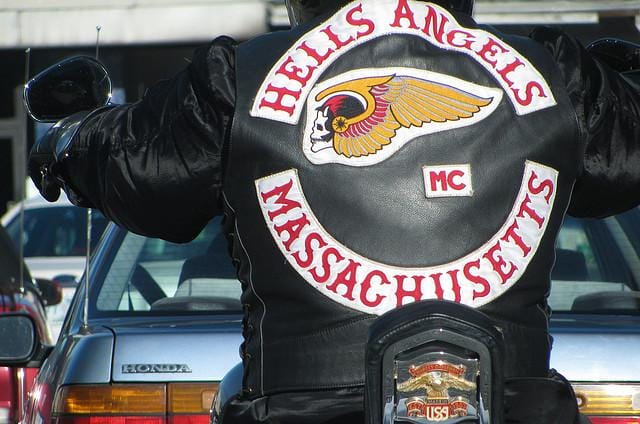Photo credit: Mark Sardella
When you think of someone litigiously protecting their trademarks and intellectual property, who comes to mind? Disney lobbying to extend copyrights and keep Mickey Mouse out of the public domain? Apple securing a patent for the “rounded corners” of the iPad and iPhone?
How about Hells Angels?
As a New York Times article reports, Fritz Clapp, an intellectual property lawyer, is kept busy by Hells Angels protecting the “many registered trademarks” of the famous motorcycle club. Clapp has sued Marvel Comics into changing the name of a comic book character from Hell’s Angel to Dark Angel and Toys “R” Us for selling a yo-yo with an image that resembled Hells Angels’ winged death head logo. According to the Times, he has brought a dozen cases to Federal court on behalf of the motorcycle club over the last seven years. Hells Angels is so protective of their brand that members’ T-shirts and jackets that have the group’s name or logo are considered property of the club, on loan to individuals while they’re in the club.
Hells Angels’ litigiousness doesn’t seem in character. Since 2011, the Department of Homeland Security has considered it a criminal organization similar to “the Mafia, the Chinese Triads and the yakuza, the Japanese syndicate.” Hells Angels faces regular accusations from law enforcement of being a gang and charges of extortion, drug trafficking, and money laundering. And working the court system seems odd for a group that enjoys its rebel, counterculture lifestyle and espouses a “philosophy of being free.”
But the group is not all hellraising. While not claiming to have no involvement in criminal activities, the club has claimed to be misunderstood and unfairly vilified since Hunter S. Thompson wrote about the group in 1976. Thompson discovered that while the group would pick fights – and their manner of beating the crap out of someone for a small slight understandably made people assume the worse – charges of Hells Angels stealing, raping, and killing with abandon that appeared in police reports and newspapers fell apart on closer inspection.
“When we do right, nobody remembers. When we do wrong, nobody forgets.”
~Hells Angels motto
Members stress that they are a club focused on motorcycle rallies and events – not a gang. Hells Angels’ lawyer Fritz Clapp works for the nonprofit Hells Angels Motorcycle Corporation that holds the group’s trademarks and has board members from its decentralized local chapters. As the Times reports, a lawyer representing an apparel distributor selling T-shirts with the Hells Angels name was “not sure whether we had to worry for our safety,” but found that the group behaved “civilly” when it sued to protect the Hells Angels name. Hells Angels’ members include lawyers, accountants, and doctors. Despite a reputation for violent confrontation, a Hells Angel member forced by police to leave a San Francisco 49ers football game for wearing a club jacket sued the stadium over his 1st Amendment rights.
The club’s purpose in litigating seems a mix of commercial interest and a desire to control their image. As the Times writes:
“But over the years, the group collectively made a leap from image to brand, becoming a recognizable marque and promoting itself on items as varied as T-shirts, coffee mugs and women’s yoga pants. Sonny Barger, 75, the longtime Hells Angels leader, at times has offered his own online bazaar of goods that bear his name: sunglasses, bottles of cabernet sauvignon and books he has written.”
But the group’s commercialism seems ad-hoc rather than a central project. Its one retail store is in Toronto, rather than its birthplace in California or regions where it is more well known.
Instead the intent seems more about controlling their own name. The Hells Angel lawyer described their purpose as “to educate the public” not to use the Hells Angels name for their own purposes. Its leader told the Times, “There’s a million people out there that want to make a dollar off of the name Hells Angels and the emblem Hells Angels, and we try to stop them.”
Reading about Hells Angels’ adventures in intellectual property, you get the feeling that if Che Guevara – the Marxist Revolutionary whose image is sold on countless T-shirts and posters as an emblem of rebellion – had lived longer, he too would sue companies using his image. The mainstream that countercultures reject has a way of commercializing their rebellion. For Hells Angels, working the system may be the only way to make sure that its name and image isn’t appropriated by it.
This post was written by Alex Mayyasi. Follow him on Twitter here or Google Plus. To get occasional notifications when we write blog posts, sign up for our email list.




